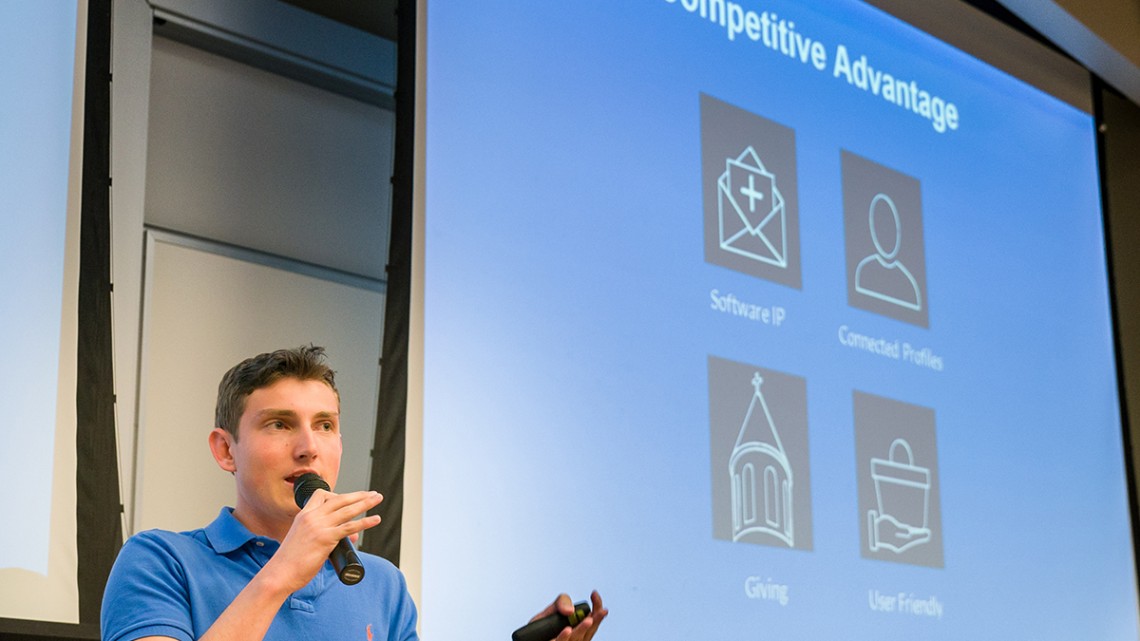
Peter Cetale '19 describes the benefits of his Religio software at the Hospitality Pitch Deck Competition Nov. 13 in Statler Hall.
Software that keeps the faith wins pitch competition
By Susan Kelley
As a child, Peter Cetale ’19 had several life-threatening kidney surgeries that drew him closer to his faith. His commitment to Catholicism inspired him in his freshman year to create a software company that would help the church grow.
Cetale’s Religio software, which helps religious organizations boost engagement with their members, won first prize, $3,000 and bragging rights at the Hospitality Pitch Deck Competition Nov. 13 at Statler Hall.
“We give churches the tools to better connect, engage and retain their membership online through our software,” Cetale said. “We have a mobile app, a community engagement web platform and management software, and so we’re very proudly building the digital church of the 21st century.”
The competition was sponsored by the Leland C. and Mary M. Pillsbury Institute for Hospitality Entrepreneurship at the School of Hotel Administration. Cetale’s teammates are Eric Reuben ’19 and Albert Caldarelli ’19.
“He was very committed to his idea,” said judge Joe Tagliente ’89, CEO of Lenrock Management Group and a Pillsbury Institute adviser. “When you’re an entrepreneur and have an idea and are trying to raise funding for it, you have to be really passionate about it. He really exuded that energy.”
Religio helps religious organizations with a key problem: retaining their members. In the Catholic Church, for example, 80 percent of members leave the church by age 23, Cetale said. “Partly why they’re leaving is they feel there’s a lack of community, and that’s what Religio provides.”
The community engagement website platform allows church members to sign up for volunteering, make friends, find others with similar interests, mentor and network. A mobile app makes it easy for members to donate by phone and keep track of those donations. It’s also more efficient for the church, Cetale said. “For example, my own church gets 800 checks per month. By doing everything in cash, the church loses $60,000 in salary, because of all the time it takes to count the pennies.” And a geolocation feature lets churches know how often its members are coming to services.
Religious organizations represent a large untapped software market, Cetale said. In the U.S., Christian churches are a $14 billion industry. Religio has 12 churches signed on to use a beta version of the software. The company will raise a round of seed funding in February, Cetale said.
He plans to fold the prize money back into the business. “We’re going to start initial hires for our sales team and pay for a couple of other growth expenses as well,” he said.
The competition was designed to allow teams to practice “structuring an argument, designing visual aids and delivering a message,” said Andrew Quagliata, a Hotel School lecturer and faculty sponsor of the competition. “The [business] idea matters – we can’t ignore that. But this competition’s emphasis is to let the students practice their communications skills,” he said. “It’s a skill that they’ll use the rest of their lives.”
Initially 12 teams, each including at least one Hotel School student, competed in the first round. A group of industry experts winnowed the competitors down to four finalists.
All were outstanding, said Tagliente. “[Cetale] won by a nose.”
Elyse Wolin ’18 and Michelle Park ’18 won second place and $1,500 for Sweat in the City, a metasearch platform that helps travelers find fitness studios. Coming in third for a $500 prize was Hunter Friedland ’19 and Derick Simmons, MHA ’19, founders of Rewardzzz, which consolidates rewards points and allows customers to redeem them with any merchant in the program. Ilan Filonenko ’18 and Yash Malhotra ’18 won fourth place with QuicKey, an app that lets day travelers rent hotel rooms by the hour.
The panel of final-round judges included Marco Benvenuti, MMH ’05, co-founder of Duetto, and Thomas Shattan, co-founder of Shattan Mendel Enterprises.
Media Contact
Get Cornell news delivered right to your inbox.
Subscribe